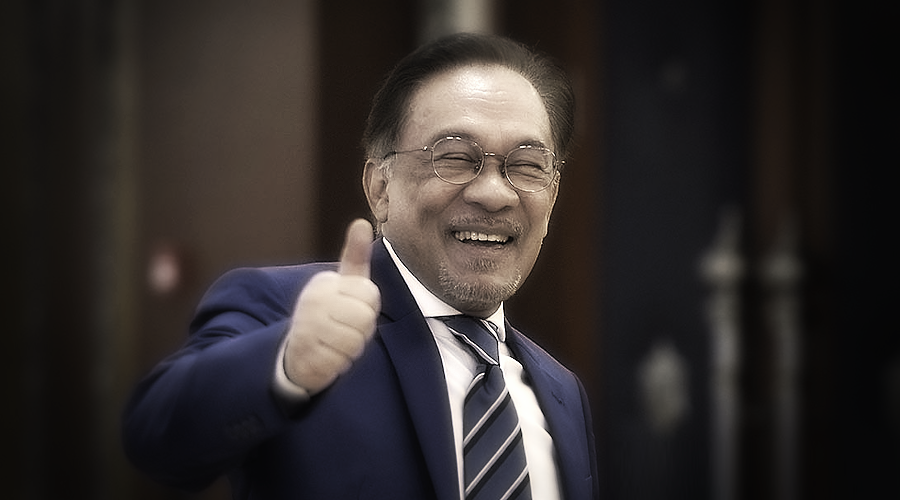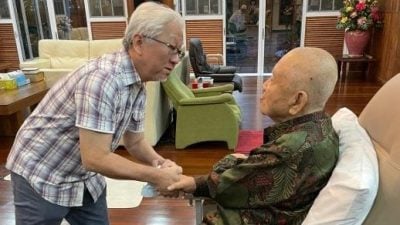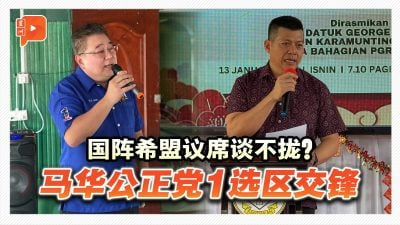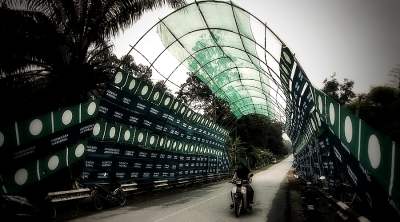
After his dismissal as deputy prime minister back in 1998, Datuk Seri Anwar Ibrahim went through 24 whole years of political ups and downs, during which he witnessed the installation of five other prime ministers, before eventually emerging as the nation’s 10th prime minister.
Anwar has experienced political despair not many can endure—marked by excessive mudslinging, humiliation, isolation and fear—and his ascent to premiership was at one point inconceivable.
In 2018, Pakatan Harapan rose to power, banking on the opportune timing and years of public frustration since the Reformasi years. On the back of extreme public outcry across ethnic confines thanks to Najib’s lackluster stewardship, PH saw itself rising to the core of the nation’s power seat.
Malaysians initially pinned their hopes on then Prime Minister Tun Dr Mahathir Mohamad to hand over power to Anwar as promised, but such hopes were dashed following the infamous “Sheraton Move” that once again testified Anwar’s close but missed brush with the PM seat.
This was followed by the gradual emergence of a deceitful political culture characterized by one betrayal after another, and three prime ministers installed within a single election term.
Even then Yang di-Pertuan Agong Sultan Abdullah had to shake his head in utter disappointment.
In the 15th general election, although the Anwar-led PH won a total of 82 seats, it failed to cross the 112-seat threshold to form a government alone, resulting in a stalemate and unprecedented hung parliament.
Across the political divide, Perikatan Nasional under former PM Tan Sri Muhyiddin Yassin won 73 seats to emerge as strong contender in putting up a new government.
Barisan Nasional, which had 30 seats, and GPS of Sarawak with 23 seats, became ultimately important for the two rival camps to try to win over in collaboration talks.
Back then many focused their attention on only two candidates for the prized premiership—Muhyiddin and Anwar. As a matter of fact, a third candidate was also being considered— senior vice president Fadillah Yusof, who is today one of the country’s deputy prime ministers.
After several days of political deadlock and multi-party negotiations, under the active mediation by His Majesty Sultan Abdullah, the decision was made: PH and its former sworn enemies BN and GPS agreed to form a “Unity Government.”
Taking over the mess he inherited from his predecessors, Anwar understandably would require extra time and effort to institute his pledged reforms.
Even to this day, Anwar’s political path is still rocky. On the one hand, his Malay support remains unconvincing, and on the other hand, the “Reformasi” movement he galvanized back in 1998 has been incapacitated under tremendous pressure from the Malay vote and relentless pursuits of conservative forces in the likes of Bersatu and PAS.
The same has also disenchanted many a Chinese and Indian voter who once went all out to support PH.
Among the promises of “Reformasi” are: repealing SOSMA and the Sedition Act once exploited by the BN government to suppress the opposition and dissidents, combating corruption and abuse of power, promoting pluralistic and inclusive politics to end racial politics, exempting tolls, recognizing the UEC certificate, and achieving judicial independence and institutional reform.
Unfortunately, such reforms have been slammed for being too sluggish or downright stagnant. Public displeasure has emerged, and “Reformasi” ridiculed as extinct. Umno President Ahmad Zahid Hamidi’s DNAA (discharge not amounting to acquittal) verdict, in particular, has seen public uproar intensifying.
Some recent developments including controversy over the exclusion of SPM “A-” from the “A” grade, have contravened the prime minister’s assertion that 10A students will be assured a place in any matriculation program regardless of race.
Apparently, it is inappropriate to change the rules of the game after exam results are announced. In the end, the bill still falls on the Madani government led by Anwar!
After news of social activist Fahmi Reza’s ban from leaving the country went viral, Anwar immediately expressed his concern and urged the police to review the decision, which the police later dismissed as sheer misunderstanding.
This incident has put Anwar and his government perceived as upholding the “Reformasi” spirit in an embarrassing dilemma, giving their political rivals ammunition to accuse the PM of abandoning his supporters, despite all the explanations offered.
In the meantime, following the eruption of the Sino-US tariff war, the global political and economic landscape has become unpredictable, as risks and uncertainties show up.
Petronas’ announcement to retrench 5,000 workers could trigger a domino effect of more layoffs, as Malaysian businesses, in particular the SMEs, are downbeat about business prospects.
Even against this backdrop, Anwar has opted a path that might spell a headstart but is politically unpopular—progressively slashing day-to-day subsidies such as for diesel, eggs, petrol, gas and electricity tariffs.
The PM did not just stop at one, but went on to cut subsidies one after another, arguing that this was to provide more targeted assistance to those really in need.
This is something no prime minister has ever attempted to do, almost politically suicidal, but Anwar hopes to accomplish the structural reforms before the next general election.
Despite his political rivals’ intensifying moves, Anwar is knowingly adopting the risky path. I wonder whether this is an act of political suicide, or a painstakingly orchestrated design.
What makes Anwar so confident and fearless?
Anwar has stressed over and again that his government is not trying to remove all subsidies but provide more “targeted assistance” to stop the wealthy from benefiting from government generosity.
He has repeatedly reiterated that as much as 85 percent of the country’s population is enjoying the many subsidies provided by the government.
Having said that, the success of this policy depends a lot on the government’s execution ability—especially in precisely identifying the eligible community—and maximizing resource distribution efficiency, which will affect the people’s trust in the government.
The government cannot repeat the PADU mistakes lest the Madani government subject itself to public censure and onslaught.
As a matter of fact, once the government cancels these subsidies, lower-segment beneficiaries in society will invariably worry whether the remaining subsidies will also be progressively reduced or cancelled in future.
Additionally, the government has announced that sales and services tax (SST) will be expanded to encompass six other areas, including leasing, construction, beauty, finance, private healthcare and education, beginning this July.
Such a move has been poorly timed, as the public will feel uneasy that goods prices are about to rise one after another.
In fact, the middle class generally believes they have been chronically neglected by the successive governments, as they are shut out from almost all government assistances and benefits.
With skyrocketing cost of living and mounting financial pressure, the so-called “subsidy rationalization” and the advent of various new taxes could as well be the straw that broke the camel’s back!
Mentioning wealth disparity in the country, Malaysians tend to focus on the gap between the Chinese and the Malays. Nonetheless, such comparison is not only distorted, it could also aggravate intercommunity distrust.
The gap between the rich and poor has been around for decades in all of the country’s ethnic groups, including the widening wealth disparity within the Malay community. To start with, this phenomenon is not exclusive to any particular ethnicity!
While we still have two more years to go before the next general election, all signs show that the 16th general election will very likely be held earlier next year.
It is therefore not surprising that the PM’s political rivals, including PAS, Bersatu, and Tun Mahathir who would never conceal his intent to launch his “Mahathir 3.0” warfare to wrestle the top administrative post for a third time, have already jumped into action.
These people have continued to wage merciless assaults against the Anwar administration and sow the seeds of discontent among the Malay electorate.
They have overlooked the reality that all the rulers in this country, the commanders-in-chief of the armed forces, the police, as well as civil service and the federal cabinet are predominantly Malay, and have gone ahead to set up a “Malay Secretariat Committee” said to “unite the Malays and allow the Malays to regain control of the country’s power.”
While they claim the establishment of this committee is for “Malay unity,” it is in fact intended to spawn unrest within the Malay society by painting DAP as an imaginary enemy in a bid to topple Anwar’s Unity Government come GE16.
Despite his political rivals’ intensifying moves, Anwar is knowingly adopting the risky path. I wonder whether this is an act of political suicide, or a painstakingly orchestrated design.
Considering the country’s existing political landscape, whoever becomes the prime minister will need to confront and fix the chaos inherited from previous administrations.
Unfortunately, our politicians appear to have been customarily blinded by their personal or partisan interests and animosity. It is visible that political parties are much more inclined to fight for more power than run the country properly and conscientiously.
Malaysians from all ethnic backgrounds have fallen victim to endless political struggles and are forced to endure the chaos and disappointment.
ADVERTISEMENT
ADVERTISEMENT








































